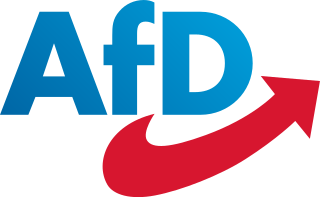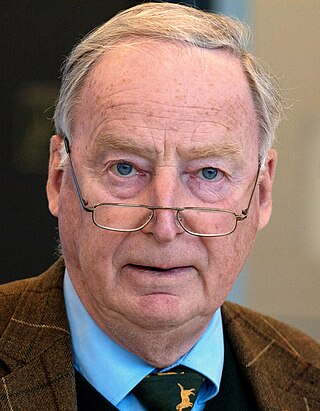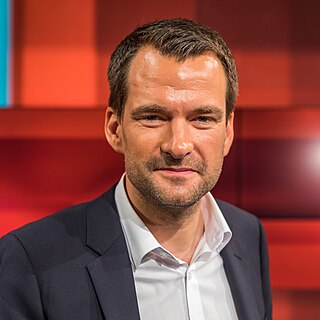
Erika Steinbach is a German right-wing politician. She previously served as a member of the Bundestag from 1990 until 2017.

Joachim-Friedrich Martin Josef Merz is a German politician serving as Leader of the Christian Democratic Union (CDU) since 31 January 2022 and as leader of the Union parliamentary group as well as the Leader of the Opposition in the Bundestag since 15 February 2022.

Federal elections were held in Germany on 24 September 2017 to elect the members of the 19th Bundestag. At stake were at least 598 seats in the Bundestag, as well as 111 overhang and leveling seats determined thereafter.

Alternative for Germany is a right-wing populist political party in Germany. AfD is known for its Euroscepticism, as well as for opposing immigration to Germany. As a right-wing party, AfD is commonly positioned on the radical right, a subset of the far-right, within the family of European political parties that does not oppose democracy.

Eberhardt Alexander Gauland is a German politician, journalist and lawyer who has served as leader of the right-wing political party Alternative for Germany (AfD) in the Bundestag since September 2017 and co-leader of the party from December 2017 to November 2019. He has been a Member of the Bundestag (MdB) since September 2017. Gauland was the party's co-founder and was its federal spokesman from 2017 to 2019 and the party leader for the state of Brandenburg from 2013 to 2017.

Leif-Erik Holm is a German politician of the AfD party and since 2017 member of the Bundestag, the German federal parliament.

An indirect presidential election was held in Germany on 13 February 2022 to elect the next president of Germany.

Armin Schuster is a German politician. A member of the Christian Democratic Union (CDU), Schuster has been serving as State Minister of Internal Affairs in the government of Minister-President Michael Kretschmer since 2022.

Martin Johannes Sichert is a German merchant and politician (AfD). He has been a member for his party in the 19th Bundestag and since 25 November 2017 its Bavarian state chairman. Sichert was born in Nuremberg, and completed his studies as a business graduate at the University of Erlangen-Nuremberg in 2006. He worked in Regensburg for more than seven years. At the beginning of the millennium he was a member of the Young Liberals. Martin Sichert has been chairman of the AfD district association Nuremberg / Schwabach and was 2017 direct candidate in the constituency Nuremberg North. From 2017 to 2019 he was State Chairman of the AfD Bayern.

Tino Chrupalla is a German politician of the Alternative for Germany (AfD) party, and Member of the Bundestag since 2017. In November 2019, he was nominated by Alexander Gauland to replace him as co-chairman and later elected to the position. Since 2019, Chrupalla has served as chairman and lead spokesman for the AfD.
Andreas Bleck is a German politician for the populist party Alternative for Germany (AfD), and since 2017 a member of the Bundestag, the German federal parliament.
Joana Cotar is a German politician and since 2017 member of the Bundestag, the federal legislative body. Until November 2022, she was a member for the Alternative for Germany (AfD).
Berengar Elsner von Gronow is a German politician for the populist Alternative for Germany (AfD) and since 2017 member of the Bundestag.

Michael Espendiller is a German politician for the populist Alternative for Germany and since 2017 member of the Bundestag.

Christian Hirte is a German lawyer and politician of the Christian Democratic Union (CDU) who has been serving as member of the German Bundestag since 2008. Since 2020, he has been the chairman of CDU in Thuringia.

Johannes Vogel is a German politician of the Free Democratic Party (FDP) who has served as a member of the Bundestag from the state of North Rhine-Westphalia from 2009 until 2013 and since 2017.

Matthias Hauer is a German lawyer and politician of the Christian Democratic Union (CDU) who has been serving as a member of the Bundestag from the state of North Rhine-Westphalia since 2013.

Heribert Hirte is a German legal scholar and politician of the Christian Democratic Union (CDU) who served as a member of the Bundestag from the state of North Rhine-Westphalia from 2013 until 2021.
The Desiderius Erasmus Stiftung e.V. is a German political party foundation. It is politically associated with but independent of the right-wing party Alternative for Germany (AfD). The foundation's headquarters are located in Berlin. Its current chairwoman is the former Christian-democratic Member of Parliament Erika Steinbach.
In Germany's federal electoral system, a single party or parliamentary group rarely wins an absolute majority of seats in the Bundestag, and thus coalition governments, rather than majority governments, are the usually expected outcome of a German election. As German political parties are often associated with particular colors, coalitions are frequently given nicknames based on the colors included. Prominent political parties in Germany are the CDU/CSU (black), the SPD (red), the Greens (green), the Left, the AfD (blue), and the FDP (yellow).















